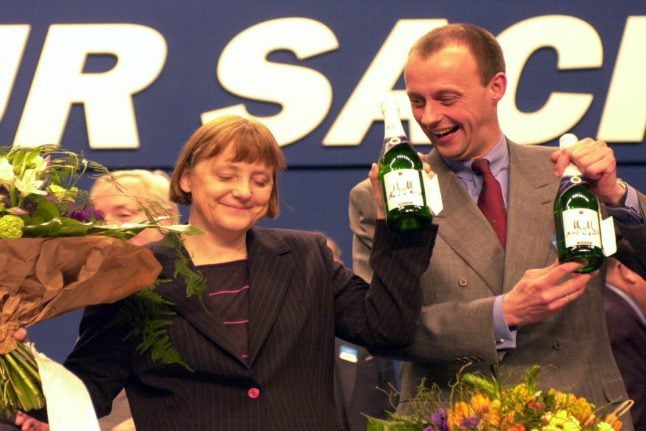Angela Merkel faces strong headwinds in her bid to see out her fourth and final term as Germany's chancellor as a long-time nemesis emerges in the race to succeed her as party chief.
In her two-step plan to leave politics, Merkel has said she will first give up the Christian Democratic Union (CDU) party leadership in December before leaving as chancellor when her mandate runs out in 2021.
Merkel has said she hoped the announcement of her withdrawal would allow her fragile coalition to finally focus on governing Europe's top economy, rather than lurch from crisis to crisis because of infighting.
But her time as chancellor could yet be cut short if corporate lawyer Friedrich Merz, who has long nursed a grudge against Merkel, wins the race to lead the party at a congress in December.
A day after Merz, 62, declared his candidacy, German media give him a real chance at grabbing the top seat with the backing of the CDU's conservative wing.
“His candidacy has electrified the CDU because in Friedrich Merz, the anti-Merkel is reaching out for the party chairman seat,” said national daily Süddeutsche Zeitung.
“His election would be a political turnaround in the Union. And his candidacy would thwart the career plans” of other top CDU figures who are also vying for Merkel's job.
CDU general secretary Annegret Kramp-Karrenbauer as well as health minister and Merkel critic Jens Spahn have also thrown their hats in the ring.
Armin Laschet, the premier of Germany's most populous state North Rhine-Westphalia, could be a fourth contender.
A win by Kramp-Karrenbauer or Laschet would better allow the German leader to see out her term.
But two separate polls commissioned by business weekly Handelsblatt and Spiegel Online show Germans favouring a Merz comeback over the other hopefuls.
SEE ALSO: Who is leading the race against Merkel?
'As it was before'
Once a career CDU man, who started out in the youth wing of the party before rising to lead its parliamentary group, Merz's political ambitions were short-circuited in 2002.
After the CDU lost the general election that year, then party chief Merkel made it clear to Merz that his time leading the group in the Bundestag was over.
Merkel took over as leader of the CDU on the opposition benches and three years later, became chancellor.
A wounded Merz left the Bundestag altogether in 2009, and returned to work as a lawyer.
Today, he is the supervisory board chairman of the German unit of mammoth asset manager BlackRock. He also holds top supervisory positions in several other major corporations, including Axa, Deutsche Boerse and HSBC.
His proximity to industry would likely win him backing from economic leaders. In Merz, the business lobby would find a dyed-in-the-wool conservative who champions tax breaks.
“There is already backing from economic advisors and SME entrepreneurs,” said political analyst Oskar Niedermayer.
“With his economically liberal and socially conservative positions, he would be the clear antithesis to Merkel,” he added in an interview with Rhein-Neckar Zeitung.
In public clashes with Merkel before he quit parliament, Merz had pushed for tax cuts and complained she was shifting the centre-right party too far left and alienating core voters.
Although he has not made his views public about Merkel's deeply polarising refugee policy that let in more than a million asylum seekers since 2015, Merz had controversially backed the concept of a “Leitkultur” or the guiding or dominant national culture.
Conservative daily Frankfurter Allgemeine Zeitung said his position could appeal to right-of-centre voters who have drifted away from the CDU to the far-right AfD, attracted by the young party's campaign against immigrants.
“The far-right party sees him as a real danger,” said the newspaper.
Merz offered the traditional conservative wing of the CDU “the promise that everything can be as it was before,” said the Süddeutsche Zeitung.
“Merz is the projection screen for anything and everything. And that's what makes his candidacy so promising, and his possible competitors so nervous.”




 Please whitelist us to continue reading.
Please whitelist us to continue reading.
Member comments